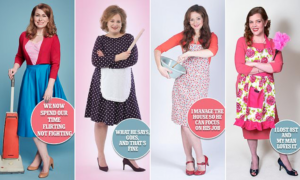Double-Shift: Dialectic of the Tradwife
Have you ever felt impelled to describe someone as “the opposite of a tradwife”? I have. I was thinking of a “momrade”: someone gifted at bringing people together in various struggles to deprivatize as many of life’s labors as possible, instead of devoting her life to an intensive contract between herself, one husband, God, a piece of private property, and the nation-state. The person I had in mind leads tenant strikes, grows people’s kitchens, makes cohabitational nonmonogamy look easy, and feels passionately about the need to revive cooperative childcare and home care schemes on the political left.
When I texted the phrase “opposite of a tradwife” to my friend, however, this isn’t what she heard. She took it as a slightly snarky comment meaning something like: a slovenly and man-frightening appearance, a lack of talent in the kitchen, an inability to commit to marriage, and the singledom of a “cat lady” as her destiny. Although I see nothing particularly pejorative in that list either, I was taken aback. What does our culture think of as the opposite of a tradwife, and why? I resolved to educate myself.
“I see these beliefs as wildly outdated,” the British BBC television presenter Stacey Dooley says as she rides in the back of a car to the English home of the “tradwife”—Lillian—with whom she will be spending the weekend. She is filming the inaugural episode of Stacey Dooley Sleeps Over, season 2. The producers interpolate some visuals of permed alt-right influencers wearing 1950s-inspired aprons over housedresses, baking cakes, and speaking on TikTok and YouTube to help the viewer unfamiliar with the #tradwife trend fill in the blanks. “Over the last fifteen years,” the voiceover intones, “I’ve forged a career that has allowed me to be a self-sufficient, independent woman.”
Dooley’s voice is playing now over footage of her meditatively putting on her signature chunky gold hoop earrings in front of a mirror, an invitation to us all to contemplate the pride of independent womanhood. Stacey is taking her time, teasing our curiosity about where she will be “sleeping over” this week. “Settling down with a husband and kids has so far not been a priority,” the voiceover continues. But:
Recently, I heard about Tradwives: a growing community of women around the world that have rejected their career ambitions to focus solely on becoming the archetypal good housewife. This weekend, I’m going to stay with one such woman, who traded great career prospects to become a Tradwife.
Target announced, we cut back to the car that is shuttling the redheaded, sweatpants-wearing, internationally decorated documentary-maker—much trumpeted by the BBC as their in-house working-class feminist presenter—to her first seasonal engagement in a select list of “Britain’s more extraordinary families.”
The BBC positions tradlife as extra-ordinary. Indeed, as Dooley notes, some see it as a movement. One might object that this premise contradicts the word printed on this ideology’s cute vintage tin: “tradition.” But the paradox is an old one. Traditionalists, from the Tea Party to the KKK to Straight Pride, have loved to present themselves as insurgently—almost punkily—normal (un-woke, shall we say). An ironic illustration of this counterinsurgent-futurist stance is the rather startling name of the social media account run by Stacey’s soon-to-be hostess: “The Postmodern Mom.”
Whether to prevent confusion over jargon, or to avoid giving right-wing content-creators even more free publicity, the BBC chooses not to include the names of Lillian’s channels in Stacey Dooley Sleeps Over s02e01. I myself hesitate to draw attention to the internet handles of people who peripherally belong to a revival of “occidentalism” and Christian nationalism worldwide. (The BBC perhaps imagined, erroneously, that Lillian and Felipe’s non-whiteness rules out their commitment to these dimensions of the “trad” movement.) Yet it bears spelling out: in the mind of the Postmodern Mom, postmodernity does not signify an infinitely deconstructible welter of unstable epistemes.
On the contrary, “The Postmodern Family” brand Lillian curates is intended to express a refusal of modernity in the name of patriarchal Christendom. So, in other words, the fantasy is a fantasy of a golden age of pre-modernity. Tradwifeism amalgamates aesthetic elements of the middle-class American 1950s—baking in heels—and the courtly European 1550s—walling your beautiful wife and kids up in a fort while you go off on crusades.
For many Christian tradwife influencers, this paradise lost is already synonymous (in their minds) with a luminous idea of indigenous whiteness that is still alive but has almost been extinguished by the evil forces of Islam and/or Jews, heathenism, feminism, and “white genocide.” For others, espousing the #tradlife may derive at first from a relatively non-racist, progressive-ish, simple curiosity about Christian homesteading, and only gradually turn into full-blown queerphobia and ethnonationalism by the grace of Reddit. Come for the soup recipe, in other words, stay for the white supremacy.
But even for apparently non-fascist tradpersons such as Lillian and Felipe (and I must say, the copious Roman-Christian art on their walls raises some suspicions), modernity is to be defined primarily in terms of the mass entry of middle-class women into the formal labor force. It is fair to say that Christian conservatives often blame the feminization of labor markets for things like “cultural decline,” declining domestic birth rates, and (like it’s a bad thing) transness.
On the far left, too, women’s mass entry into the labor market is not exactly celebrated as an uncomplicated win. In Marxist-feminism, the term “double shift” refers to the deeply exploitative fact that many feminized people work (at least) two days: coming home from the call-center, for example, only to be on-duty for an extra five hours without pay, tending to the needs of their household. Revolutionary attempts to destroy the double shift were made in the 1970s, but alas, capitalism survived. And in 2023, the data is clear: the double shift hasn’t remotely gone away. Indeed, proletarian men, as well as women, are sick to death of overwork right now, a trend which was acknowledged by the media in 2021 and 2022, where it was called “The Big Quit” or “Great Resignation.” In this context, any movement that says to a group of people “What if you could cut out one of your two shifts?” is almost guaranteed to attract interest.
It would be amazing if Stacey Dooley approached tradwifery in the context of the Big Quit, but she doesn’t. Nor does she seem worried about racism in the movement, or cissexism. She doesn’t mind the tension between “wildly outdated” and “extraordinary” in her speech. She is scrolling on her phone, supposedly researching her topic at the eleventh hour. Lillian has posted various #tradwife life lessons for cultivating feminine submission. If you want to be a tradwife, never speak over your husband, especially in public; always look immaculately pleasing and physically inviting (yet modest); express any anger you have quickly and petulantly, like a tiny child; and, if necessary, refuse outright to “lead.” Over the course of the episode, Lillian will actually trot out several of these top tips, while teaching our Stacey how to use a kitchen scale.
Just like many other contemporary tradfluencers (some of whom are explicit about it), Lillian’s feed appears to crib from the late Helen Andelin, the 1960s “marriage guru” and founder of the “Fascinating Womanhood” movement. First issued in 1963, Andelin’s cult bestseller Fascinating Womanhood: How the Ideal Woman Awakens a Man’s Deepest Love and Tenderness is now in its sixth edition at Random House. For six decades, fanatical Andelinians all around the world have preached—and monetized—a self-help doctrine of uxorial mortification, self-infantilization, and husband-worship.
Problems in any given marriage, they say, inevitably flow from a womanhood insufficiently fascinating. In a world atomized by capitalist liberties, such shortcomings are, for sure, likely. But with good faith and diligence, ladies, heterosexuality can and must be renaturalized—revitalized. Sisters! Let us get down to work, unwaging femaleness anew. A woman who works for a boss is cuckolding her one true boss: the man who bought exclusive rights to her labor by putting a ring on it. The good news is, she can just stop. According to the website of the Fascinating Womanhood teacher network, a woman’s essential (unwaged) nature, joyfully embraced, can bring “love and order” both to marriages, and to the world.
We can’t see Stacey’s screen. One surmises that Stacey is taking in the vibe of various neo-Andelinian items. Perhaps she has stumbled upon the website “SetApartGirl,” a vehicle for flogging copies of Set-Apart Femininity: God’s Sacred Intent for Every Young Woman (2008) by the Colorado-based Christian antifeminist Leslie Ludy. Perhaps she’s clicking on, from there, to the twenty-first century “purity ministry” of Mrs Ludy and her husband Eric, a franchise that comes recommended by a friend of Lillian’s, Alena Pettitt (the UK’s highest-profile tradwife). Or maybe Stacey is just skimming one of the ecstatic articles on the #trad phenomenon in Britain’s largest-circulation newspaper, far-right tabloid The Daily Mail.
“Darling, I’ll do anything to make you happy!” reads one Daily Mail headline: “How the Tradwives sacrifice their own careers to satisfy their husbands’ every whim… and insist it’s the secret of marital bliss.” In Google Images UK, one of the top results for “tradwife” comes from the latter article. Four white women stand wearing hideous print pinafores, each bearing a quote. “WHAT HE SAYS GOES, AND THAT’S FINE,” beams one with a rolling-pin. “WE NOW SPEND OUR TIME FLIRTING, NOT FIGHTING,” says Mrs. Pettitt next to a vintage vacuum cleaner. “I MANAGE THE HOUSE SO HE CAN FOCUS ON HIS JOB,” someone else chimes in, holding a mixing bowl. Lastly, the short straw was evidently drawn by the woman holding the feather duster: “I LOST 8 STONE (112 lb) AND MY MAN LOVES IT.” Chivalry is not dead.
Stacey makes a face. All of a sudden it strikes me that, in the short-circuited meaning-making exercise that is about to unfold, she is every bit as pivotal as the Tradwife. For Stacey doesn’t come unfreighted to the fray. She expounds a liberal feminism that enables rather than challenges tradwifery by reifying the inescapability of the private nuclear household as the organizing matrix for the world’s reproductive labor—the precondition for its push for women to go “beyond” it and “aspire.”
In 2018, Dooley published a bestseller demonstrating how a girl from a council estate can rise to the highest echelons of humanitarian journalism, with nary a mention of the domestic division of labor that might subtend that meteoric rise. On the Front Line with the Women Who Fight Back is a standard-issue liberal feminist collection of memoiristic “storytelling” sequences based on TV reportage Dooley conducted for BBC3 among “fierce” and “resilient” trafficking victims and child brides around the world. With Dooley herself positioned, in this saga, as the role model for women in the global south to aspire to, as usual, the most that liberal feminism can envision for women is equal professional success, paired with an equalization of the burden of housework between husband and wife at home: a lighter “double shift” for two. Travel and hustle are Stacey’s birthright; she “can’t imagine anything worse than being a tradwife.”
Yet anyway here she is, a striver who pulled herself up out of the darkness of Luton and now sips oat lattes like an elite north Londoner, preparing to meet a privileged, overeducated, Hong Kong-born American housewifery-evangelist. Will this be a clash of the titans? No, of course not; we live in a democracy. Dooley, and this is crucial I think, presents a sweet, non-confrontational face. Though she be a girlboss, she speaks in a vague and child-like cadence. “My understanding of this movement,” she confides slowly and dreamily to the camera, “is: these women are very obedient. The husband is very much in charge. And they just take care of all the household chores, look after the kids, dress a certain way, present themselves a certain way.” A short pause, then she cracks a joke: “Essentially, everything I’m not!!”
It dawns on me that Stacey expects, when she produces these quips, to be told, “lol, good for you, Stacey.” This is why she repeatedly exclaims—later—“good for you, Lillian!”—having extracted sex-positive “confessions” from her hosts, e.g., Lillian loves having sex with her husband at any time of day. Secular morality in England is all about “naughty” and “cheeky” (as in, go on then, cut me a cheeky slice…) transgressions of a generalized prohibition on desire. In that context, Stacey has just said—naughtily—that she is “everything” the “obedient” tradwives are not. But in what sense is she “disobedient”? To what? Does her boyfriend try to boss her around, and meet with resistance? Is she active in #MeToo, or a union? More likely, the transgression is of Englishness’s injunction against self-psychologizing, at least as much as the gender order. Still, “I totally see myself as a feminist,” Stacey insists as she rides in the BBC’s car. “And I suppose Lillian’s set-up begs the question: is this two fingers up to feminism?”
Come on, guys, let’s find out! The sleight of hand is easy to miss. Notice how, in order to make sense as the hook for a show, the answer to this question can only be one thing: “Not really.” The phrase begging the question is unintentionally apposite: Lillian is very open in identifying as an antifeminist. There’s no mystery about it. Stacey will even point this out to her: “you’ve compared feminism [in your tweets] to cancer.” And Lillian won’t deny it. But Stacey’s demeanor shall remain free of agitation or anger. As though discussing a preference for sex over chocolate, she’ll say that actually, in her view, equality in the west is still a long way off. “REALLY?” yelps Lillian. Stacey is relaxed. Stacey projects zero discernible investments in the struggle for gender freedom.
In England’s TV establishment, the role of “chill” (not to say checked-out) feminist is one Ms. Dooley can reliably be called on to play. In 2022, she was a proudly undomestic celebrity contestant on The Great British Bake Off, fundraising for cancer research. Humblebragadociously, as the cameras rolled, Stacey declared that she had “never” baked. Never ever. What, not even banana bread?! No, not even banana bread, and so on. Stacey grinned, goofily faux-regretting the fact that she was going to come last. Stacey from the block, the prestige professional always half-laughing at herself and keeping the vibes easy—Stacey the Feminist Non-Killjoy—this is surely the perfect establishment emissary to send to hug a tradwife. And lo and behold: Lillian posts a video to her feed afterwards, talking about how lovely she was (much to her surprise!).
Even more so than Christian women, who are allowed to censure sluts according to scripture, secular liberal feminists must never “judge” other women for their “choices.” Stacey thus limits her initial “judgements” on tradwifery to simple statements of taste: she wouldn’t enjoy this, personally; she’d suck at it; it’s not for her, etcetera. And her moral arc will bend inexorably towards acceptance: “I know for a fact that there will be women watching this that will be angry I’m not being more assertive about this,” she will eventually conclude, wrapping up the episode. “But I’d say, you know: feminism? It’s about choice. They’re grown women, they’re of sound mind. So I can’t bowl into their lives and say, ‘you’ve got this wrong.’”
These words very closely echo another bridge-building exercise that was staged on a #tradwives-themed episode of the British chat-show Roundtable (“Rethinking Feminism?”) around the same time. There, the feminist campaigner Shola Mos-Shogbamimu opened her arms to Alena Pettitt, the aforementioned founder of tradwifery resource hub The Darling Academy, where Pettitt tries to raise an #ApronCladArmy of patriotic housewives on “this green and pleasant land.” Look, said Mos-Shogbamimu with a sigh: “My kind of feminism embraces all brands of feminism. Women have the right to choose whatever kinds of lifestyle they want.” Pettitt, for her part, mouths similarly meaningless sentiments. She may be fighting for male supremacy but she is “forever grateful for feminism and the courageous women who went before me, to win the vote for me, to win choices for me.” Feminism for antifeminism, and vice versa.
Again and again, the video segments and puff pieces on the “tradwives” craze, especially since 2018, have struck this apolitical tone: lifestyles are choices, and choices are good. The ever-lurking shadow of the “opposite of a tradwife” is a lighthearted foregone conclusion, a mere question of taste. But squint at the iconography, and painful questions of political economy come out of the woodwork. And nowhere is the anti-tradwife encoded as explicitly as on Stacey Dooley Sleeps Over. Cinematographically, Lillian the Kept Woman towers, soft but powerful, over Stacey the Independent Gal. What we see is a tranquil maternal giant, of east Asian appearance, opening the door to a skinny ginger member of the hustling urban precariat.
Lillian’s university degrees and professional past make her a safe choice to represent “freedom” qua economic dependence. By the same token, Dooley’s slight, white, adorable style and lack of higher education qualifications make her a safe choice to represent women’s economic self-sufficiency in this marketplace of ideas about women’s best interests. Not being broke, she has no reason to envy Lillian’s “security.” Not having kids—but wanting some—she embodies no immanent critique of Lillian’s parenthood. Nor does Stacey project the image of a white woman rich enough to have a stay-at-home partner, or full-time housekeeper, or nanny (in fact, she likely could have all these things). All in all, she presents a plausible picture of a potential tradlife convert.
Will opposites attract, the BBC therefore gets to ask? The show chuckles benevolently. Funny old world, eh? These days, a privileged woman (Lillian) can have two Master’s degrees yet decide to exit the formal economy and receive an “allowance” from a husband to whom she has sworn (despite reluctance from the local church to revive defunct liturgical language) “obedience.” And a working-class one (Stacey) can become rich and famous in broadcasting, while declining to learn, at any point, how to breastfeed, or roast a potato. For all we know, for Stacey and her boyfriend, it’s all take-out, and deliveries, and cleaning services. How about that postfeminism.
What is screamingly obvious, yet unspoken, is the sense that Stacey and her boyfriend would have to do things differently if they wanted to raise children together. The show refuses to admit that if children were in Stacey’s picture, she’d no longer be the antithesis of the tradwife. Damn it, but what is the antithesis of the tradwife? One answer comes from focusing, as I did, on the qualitative dimensions of uncommodified care. That’s why I thought: a distributed, community-oriented, polyamorous or commune-dwelling, queer-feminist parenting situation. But this is not the answer the established commentariat proposes. For them, the focus is more quantitative, concerning the balance of commodified and uncommodified housework; the sheer amount one woman can do. Can a family’s needs be met by one mom/wife, unsupplemented by maids, cleaners, nannies, and apps?
For the BBC, the definition of a tradwife (or tradmom, I suppose) begins and ends with the woman’s choice to identify primarily with indirectly market-mediated labor — homemaking — rather than with waged or salaried productivity. And since reproductive labor is still very much gendered and naturalized (despite some advances in consciousness under Covid-19), the figure who gets installed opposite the tradwife becomes … the hard worker. It is still widely imagined that wife-work is less exigent, or in any case less real, than its value-producing counterpart. Add kids to the hard worker, and you get, not a “hardworking mom,” but a “hardworking working mom.”
Infamously, some “advice” was lately issued to the public by Kim Kardashian—a mother of four, and also a billionaire—“for women in business: get your fucking ass up and work! It seems like nobody wants to work these days.” I would bet money on Stacey nodding when she saw this. Stacey may hate housework, but that’s at least partly because, even more so than Kim (who doesn’t do any), Stacey thinks of housework as non-work.
When it comes to real work, boy, she couldn’t be more enthusiastic. A characteristic 2019 Guardian interview with Dooley swoons over the “Dooley work ethic.” In an uncanny echo of another once-poor bestselling author, Stephanie Land, whose Cinderella memoir Maid was lately adapted into a miniseries by Hulu, Dooley “says she is the hardest-working person she knows.” Thanks to this grind, recounts her interviewer, after more than a decade at the BBC, colleagues have finally started being “less snobbish to her than they used to be.”
Stacey brings no class rage with her into the corridors of the BBC. Hard work will “triumph” over everything, she believes. Even over prejudice. Odds are, if you have the right attitude, inequality never really even existed in the first place. Back in 2011, the BBC held a survey on Britain’s “real class system.” As part of their findings, they published a clip of a beaming Dooley opining that “class doesn’t matter anymore”:
I think the really really great thing about this day and age is the fact that it’s not massively important what family you’re born into. If you’re incredibly bright, or you’ve got a real passion, or you really really work hard, there’s really no reason why you can’t go on and do that.
In this Pollyannaish speech, the fact that scions of the ruling class don’t need to have, or be, or do any of those things in order to acquire rewards goes curiously unmentioned.
Back to 2021. We are now, finally, over the threshold, and inside the well-appointed living room of Lillian and Felipe Sediles, in Hampshire. Stacey starts by confirming that Lillian is a tradwife, then asks what that means. “It’s almost like our family is a business,” Lillian explains, with all the boardroom-ready poise one would expect of a financial professional with two Master’s degrees. “And he is the CEO.” Stacey smiles encouragingly at Felipe, the masculinist Nicaraguan-American man of the house, a self-declared Europhile. He comments fairly neutrally on Stacey’s multiple ear-piercings and golden hoops. “Oh, they’re my U.S.P., Felipe.” “What’s that?” “Unique Selling Point! they’re my brand!!” Later, grimacing to the camera behind closed doors as she unpacks, Stacey laughs tensely: “oh god, he hates the hoops, he hates the hoops.”
The two oldest of the three Sediles children do a little home-schooling homework for the camera. Then there’s a family prayer session. Lillian vacuums, barefoot, in her flawless glamor makeup. Stacey learns about the Jesus-emulating “rock walk” — with heavy backpack — that the children have to do on Saturdays, as penance, if they have been naughty during the week. Next, in the garden, Stacey watches Felipe sand down a piece of furniture while talking about the patriarchal protectiveness that “runs in his blood.” He is the “boss” of his family, protector of the castle. This is built into his DNA. OK, ventures Stacey, gently, but don’t we want to move away from female subordination? Of course, returns Felipe. His wife’s voice “counts just as much” as his. He makes all the final decisions, sure. But that’s because the “buck” ultimately stops at him.
Then Felipe flips the tables on Stacey, and interviewee becomes interviewer. She explains she’s never relied on a man, nor does she want to. A-ha! Felipe wants to know: does she fear dependence? Yes, Stacey replies, because financial dependence makes you vulnerable. OK, Felipe presses: then, is vulnerability bad? Well, again, yes, stammers Stacey; insofar as it can result in coercion. She would not want to be materially coerced to stay in a relationship, “but that probably sounds selfish to you.” Felipe smiles. She gets it. Yes, it does sound selfish, he says. “Because it means you wouldn’t be willing to persevere.”
Next, Lillian and Stacey prepare supper. Felipe chides them jocularly for not having the meal ready on time. Usually, Lillian always prepares meals punctually, Lillian explains. If she trips up a little, Felipe doesn’t yell at her. He just lets her know she must do better. Rightly so. She views it as her duty to keep standards high, since he’s going out to work at an engineering company every day, earning 100% of the household’s wealth (sidebar: is it 100%? what about her YouTube income?). Listen: back when they got married, Lillian considered herself a feminist. The couple’s mutual “trad” enlightenment only came some years later. Stacey will now attend Lillian and Felipe’s vow-renewal ceremony in the local church. This time around, Lillian is vowing to obey.
Stacey never stops smiling, throughout the episode. Sometimes, to be sure, in the face of Felipe’s ideological blast, her smile hardens, falters, or strains. It even flickers briefly into a frown when Lillian says, reasonably, “I think it’s a myth to say that women can have it all.” But the overriding impression is one of sunshine and goodwill, notwithstanding Stacey’s “private” comment to her camera-person, that the bonhomie between herself and Mr and Mrs Sediles is only surface-level; “deceptive.”
Will the conclusions Stacey draws from her extended “sleepover” end up in a negative place, after all? For impartiality’s sake, she meets a number of other tradwives—including Mrs Pettitt—first at the vow-renewal afterparty, and then at the church celebration for the youngest child’s baptism. She can now reveal her “surprising” takeaway from the whole experience. It is no surprise at all. Stacey has acquired a newfound respect for tradwifery:
Though I tend to associate religion with patriarchal control, none of the tradwives I’ve met over the weekend appear repressed—in fact, they seem happy. … The more time I spend with these tradwives, the more it seems it’s working for them. Both Lillian and her friends are saying, ‘we’ve lived your life, Stacey! And we’ve taken a different approach, and we’re much happier!’ I can’t ignore that.
Imagining the gender division of labor as a matter of simple choice, and choice in turn as somehow insuperably feminist, Dooley has trapped herself in the inference that she has no choice but to respect tradlife.
This is the only place a liberal inquiry can go. If anyone is “getting things wrong,” chances are, it’s Stacey herself (or so the show invites us to consider). When the cameraman asks in the final minute what her “ideal setup would be, then,” Stacey’s answer is odd, and self-disparaging. Ostensibly jettisoning her boyfriend from her future, she describes an image of loneliness and isolation in the third person. “Stacey…”—she describes the outline of a house in the air with her hands—“… and 11 bulldogs. Because she’s got no kids, she ain’t married, and she’s lonely in this massive house!!”
The right-wing trope of the “unfuckable” cat lady (who is financially successful but childless and resentful) is here rendered as a “lonely” dog lady, but the heterofatalistic logic is the same: as a woman under capitalism, your choices are essentially limited to eschewing human companions altogether, or becoming at least something of a tradwife. Lean wholeheartedly into the latter option, though, and you might find that there is an erotics to the western-supremacist patriarchal lifestyle (we might think of tradwifery, indeed, as, entre autres, a kink.) Only a fool would underestimate the sexiness, for women, of being delivered from the double shift.
Stacey, being exceptionally sharp, sniffed out the kinkiness of tradwifeism right away. I believe this is what led her to probe, repeatedly, for insight into Lillian and Felipe’s sex life, and to regret, in one scene, that her presence in the guest room was preventing them from fucking as freely as they would clearly (in her opinion) like to. Confusion about the allure of this fetish may also be what prompted Stacey to figure her future state of intimacy, essentially, as bulldog-based. Felipe refused to answer her question about whether the “obedience” dynamic between Felipe and Lillian carries over into the bedroom. And it is unclear what kind of room Stacey is thinking about when she says, later, she still can’t imagine “obeying a man.” Her tone of voice, at least, suggests Much To Think About.
Like all of us, Stacey must now go home and wrap her head around the fact that tradwives are in public and, in many cases, actively making money in the very moments when we are listening to them say that women should stay in the private realm and abstain, for the sake of men’s egos, from earning. But once again, I’m afraid, it’s an ouroboros that has existed for ages. Insofar as they romanticize feminine economic dependence while themselves (in many cases) making non-negligible incomes from the monetization of these opinions, tradwives’ opposition to “feminism” exactly mimics the self-contradictory position of figures like the attorney Phyllis Schlafly. While advocating for women to stay at home, running a campaign organization opposing the Equal Rights Amendment, and condemning the women’s liberation movement in ferocious terms, Schlafly herself regularly toured the country, directed a major political organization, angled for a position in government, and controlled large sums of money.
Side-by-side with the hypocrisy of these grifters great and small, there is, however, a powerful recognition of humanity’s desire to be liberated from capitalist work in both its waged and unwaged forms. Given the choice between spending your days making profitable TikToks of yourself slow-cooking meals while never having to worry about rent, suggests Niloufar Haidari, “versus commuting to a hideously-lit office where you stare at a screen for nine hours a day, just to come back home and then have to begin your second shift of domestic labour … only the most unhinged girlbosses among us would choose the latter.” In the end, Stacey and Lillian’s emotional labors in front of the camera—one of them doing video journalism, the other, political makeup tutorials—do not appear so very different. For those of us who have been raised on the abusive religion of work, perhaps that can be a freeing realization. Or at least a starting-point.








Dilettante Mail
Get updates from us a few times a year.